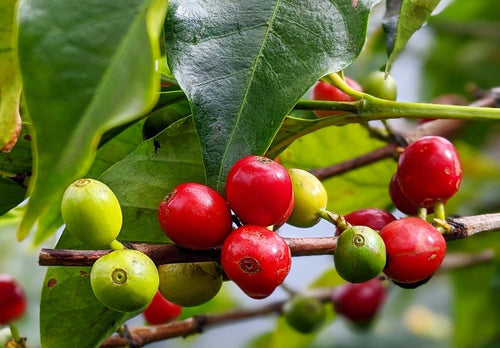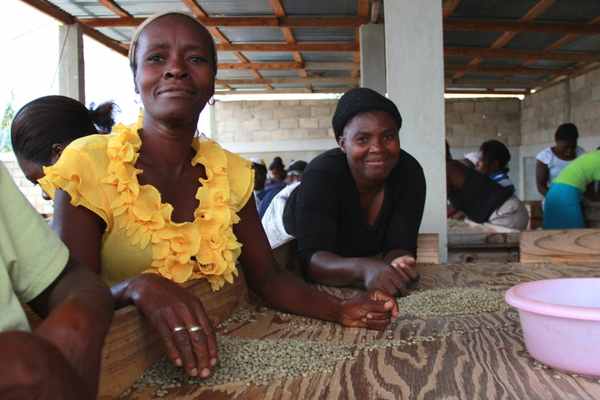21 Nov 2024
Haitian coffee has been a vital part of the country's history and economy for centuries. Introduced to the island by French colonizers in the 18th century, coffee production quickly became one of the most critical industries in Haiti. However, the industry has faced multiple challenges in recent decades, including political instability, environmental issues, and economic struggles. In this blog post, we will explore the rich history of Haitian coffee, the impact of the industry on the current island economy, the great quality of Haitian coffee, the complicated coffee and export process in Haiti's political climate, the current challenges facing the industry, and the importance of supporting the Haitian coffee community.
The History of Haitian Coffee
The history of Haitian coffee is mixed with the country's politics and economy. In the early 18th century, French colonizers brought coffee plants to Haiti, which was then known as Saint-Domingue. Coffee quickly became one of the island's most important industries, with coffee exports accounting for up to 80% of the country's revenue.

However, the coffee industry was also built on the backs of enslaved Africans forced to work on coffee plantations. This legacy of slavery and exploitation continued after Haiti gained independence from France in 1804. In the early 20th century, a small group of wealthy landowners controlled the coffee industry in Haiti and used their power to maintain the status quo. Nevertheless, in the 1940s and 1950s, the government implemented land reform policies that broke up large estates and redistributed the land to smaller-scale farmers.
Additionally, the global shift towards specialty coffee placed a greater emphasis on quality and opened up opportunities for smaller growers to enter the market. Despite these challenges, Haitian coffee has remained essential to the country's culture and economy. Today, the industry is mainly made up of small-scale farmers who rely on coffee as their primary source of income.
The Role of Haitian Coffee in the Island's Economy

The coffee industry significantly impacts Haiti's current economy, providing income and employment opportunities for thousands of Haitians. Coffee, along with mangoes and avocados, is one of Haiti's most important agricultural exports. However, the industry faces numerous challenges, including climate change, soil erosion, and political instability.
Haiti has experienced political turmoil for decades, leading to decreased industry investment, reduced government support, and difficulty accessing international markets. This has a considerable impact on coffee farmers' livelihoods and the industry's overall sustainability.
In addition to these challenges, other factors, such as limited access to financing, lack of infrastructure, and inadequate technical support, also affect Haiti's coffee industry. Despite these difficulties, many Haitian coffee farmers remain committed to producing high-quality coffee and supporting their communities.
The Quality of Haitian Coffee

Haitian Coffee is known for its high quality and unique flavor profile, distinguished by a mild acidity, medium body, and a slightly sweet, chocolatey taste. Haitian Coffee is typically grown between 800 and 1,800 meters above sea level. These altitudes, the country's tropical climate, and fertile soil create optimal growing conditions for high-quality coffee beans.
The processing methods used by Haitian coffee farmers also benefit the unique flavor profile. Many Haitian coffee farmers still use traditional, natural drying methods, which involve drying the beans in the sun, often on raised beds or rooftops. This allows the beans to develop their flavor naturally, resulting in a rich and distinctive taste.
Haitian coffee is typically described as having a smooth, full-bodied flavor with notes of chocolate and fruit, which makes it highly sought after in the specialty coffee industry. Some notable examples of specialty Haitian coffee include our offerings from Savane Zombi and Kolen, recognized for their outstanding quality.
Coffee Exporting in Haiti
Haiti's coffee and export process is complex and often involves many different actors. Most coffee farmers in Haiti are small-scale producers who grow coffee on a few acres. After the coffee is harvested, it is typically sold to a local buyer who processes and exports it.
Haiti's Challenges in the Coffee Industry
The coffee industry in Haiti has considerable difficulties that threaten the livelihoods of farmers and the quality of the coffee produced. Climate change, soil erosion, and political instability are the most urgent challenges. Farmers need help maintaining consistent crop yields and quality with rising temperatures and unpredictable weather patterns. Soil erosion is also an important issue, as many coffee farms are located on steep slopes vulnerable to erosion caused by heavy rains or deforestation. Political instability and economic insecurity also pose a significant threat to the industry. They can disrupt supply chains, create market uncertainty, and make it hard for farmers to access the resources they need to grow and export high-quality coffee.

Despite these barriers, many Haitian farmers remain committed to producing specialty coffee and have implemented clever solutions to mitigate the impact of these challenges. For instance, some farmers have adopted agroforestry practices, which involve planting trees alongside coffee plants to prevent soil erosion, provide shade, and create a more sustainable farming system. Some farmers have partnered with cooperatives like Kok Ki Chante, which supports and connects them with international buyers. These organizations provide funding for training and infrastructure projects and work to promote sustainable agriculture practices.
However, the coffee industry in Haiti is impacted by the country's political climate. Haiti has faced significant political instability in recent years, making it difficult for farmers to access the resources and infrastructure needed to transport and market their coffee effectively. In addition, corruption and violence in the country have made it challenging for coffee farmers to operate safely and efficiently.
Why the Coffee Community Should Support Haitian Coffee
The coffee community has a crucial role in supporting Haitian coffee and the country's economy. Coffee roasters and consumers can help support small-scale farmers and promote sustainable agriculture in Haiti by purchasing Haitian coffee.
Investing in the Haitian coffee industry is a way to enjoy a delicious and unique coffee experience and supports social, economic, and environmental sustainability in a country that has faced significant challenges. This makes a meaningful difference in the lives of farmers and their families while supporting the growth of a vibrant and dynamic coffee industry.

If you are a roaster looking to include Haitian coffee, check out our specialty green coffee beans from Haiti.
If you just want to roast small quantities at home, we got you covered. Check out our small bags of Haitian specialty green coffee beans.

